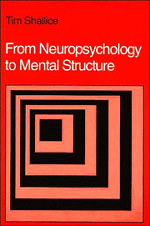Book contents
- Frontmatter
- Contents
- Preface
- I Introducing Cognitive Neuropsychology
- II Converging Operations: Specific Syndromes and Evidence from Normal Subjects
- III Inferences from Neuropsychological Findings
- 9 On Method: A Rejection of Ultra-Cognitive Neuropsychology
- 10 On Method: Single-Case Studies
- 11 Functional Specialisation
- IV Central Processes: Equipotentiality or Modularity?
- References
- Subject Index
- Author Index
- Index of Patients Cited
9 - On Method: A Rejection of Ultra-Cognitive Neuropsychology
from III - Inferences from Neuropsychological Findings
Published online by Cambridge University Press: 21 October 2009
- Frontmatter
- Contents
- Preface
- I Introducing Cognitive Neuropsychology
- II Converging Operations: Specific Syndromes and Evidence from Normal Subjects
- III Inferences from Neuropsychological Findings
- 9 On Method: A Rejection of Ultra-Cognitive Neuropsychology
- 10 On Method: Single-Case Studies
- 11 Functional Specialisation
- IV Central Processes: Equipotentiality or Modularity?
- References
- Subject Index
- Author Index
- Index of Patients Cited
Summary
Introduction
Cognitive neuropsychology is too young a field to have an accepted set of methods, let alone a training or apprenticeship procedure common to different centres of research. So those who come to work or study in the field tend to continue using the principles of the disciplines from which they arrived, and these are many and varied! However, two main approaches can be distinguished.
For the majority – those arriving from the neurosciences and some branches of psychology, particularly traditional human experimental psychology and those areas of clinical neuropsychology where test batteries are widely used – cognitive neuropsychology as represented in the earlier chapters in the book must at first seem to be a field fixed in a nineteenth-century mould. There tends to be little equipment, hard neuroscience evidence on patients tends to be ignored, and in its concentration on the individual case it uses methods that seem highly idiosyncratic if not positively dubious. For readers of this persuasion, it will be obvious that one needs to justify theoretical inferences based on single cases and the lack of discussion of hard neuroscience evidence, such as lesion localisation.
There is, however, an increasing minority who have arrived from other parts of cognitive psychology and the speech sciences. For some of them, the emphasis on the individual case, a rejection of the group study, and a lack of concern with the neurological basis of behaviour are becoming almost elements of a creed.
- Type
- Chapter
- Information
- From Neuropsychology to Mental Structure , pp. 203 - 216Publisher: Cambridge University PressPrint publication year: 1988



